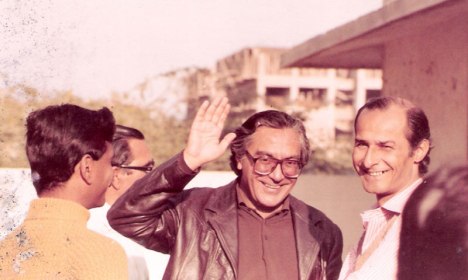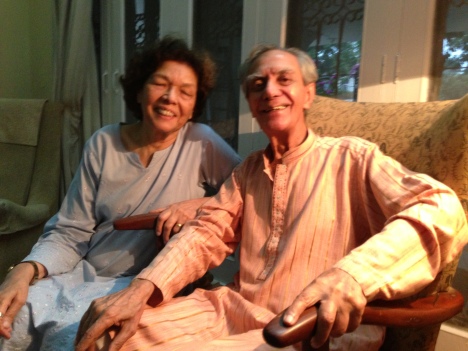
Aslam Azhar, Islamabad, 2013. Photo: Beena Sarwar
My personal tribute to a giant of progressive politics in Pakistan, published in The Friday Times on Jan 15, 2016, posted below with links that didn’t make it into the TFT copy.
By Beena Sarwar
Aslam. That’s what everyone, junior or senior, in the theatre group Dastak called him. He insisted upon it. That was just one aspect of Aslam Azhar, the founding father of Pakistan Television and already a legendary figure in the late 1980s. That was when I joined the theatre group that he had started in 1982 with his close friend and comrade Mansoor Saeed – who also insisted on being called Mansoor.
Aslam’s wife Nasreen and Mansoor’s wife Abida were also activists. Besides Dastak, they were involved in the umbrella group Women’s Action Forum that was a thorn in the side of the dictator Gen. Ziaul Haq who then held sway.
Their children Arieb Azhar, now a well-known musician, and Sania Saeed, the acclaimed actor, were very young then, and cut their teeth on Dastak.
By the time I joined them, Dastak had done several plays including the iconic ‘Galileo’, Mansoor’s Urdu translation of Bertolt Brecht’s German play ‘The Life of Galileo’, directed by Aslam who also played the part of Galileo.
“I am still astonished to remember the dedication and energy that went into this massive three-hour production, by people who had little or no prior experience in theatre, and who happily volunteered their time,“ writes Arieb in his wonderful remembrance of those days (‘The revolution that never happened’, Dawn, Sept 29, 2013). The only ones with theatre experience were Aslam himself, and Nasreen.
The play, perhaps under the guise of a historical costume drama set in Italy, managed to get past the censors (the only lines they struck out of the script were those that mentioned anything about drinking alcohol or wine making). But the audiences understood the message and the analogy.
The story of the 16th century scientist who proved that the Earth revolves around the Sun, and was imprisoned for life by the Catholic Church after being being tried for heresy, had great relevance to Pakistan where a dictator in the name of religion was crushing progressive and enlightened ideas.
Dastak was formed when the Movement for the Restoration of Democracy (MRD) was battling the army’s might.
”The terror of tyranny was in full swing and entire villages were being decimated by forces of coercion. The so-called jihad in Afghanistan was filling the pockets of rulers and a dismal pall of obscurantism was spread all over the country. In this terrifying atmosphere of public lashings and hangings, there emerged a theatre group that showed a ray of hope to the hapless,” writes Dr Nazir Mahmood, who was part of Dastak before I joined. (‘Galileo exits stage: Remembering Aslam Azhar’, The News on Sunday, Jan 3, 2015).

Aslam Azhar with Mansoor Saeed, 1980s
This “theatrical offensive”, to quote Nazir, translated and staged plays by giants ranging from Brecht and Chekov, to Gorky and Ibsen. The local martial law officers who vetted each script “had no clue about art and culture and would sometimes mutilate the script and sometimes pass it with some nonsensical changes.”
Dastak staged these plays in traditional proscenium settings like the stage at Rio Cinema auditorium (where now stands a shopping plaza) or at NED college auditorium. They also performed in the open air at the shrine of Shah Abdul Latif Bhitai and in industrial areas – where in one instance, interrupted by a power outage, the play continued illuminated by car headlights.
Aslam was a pukka sahib in many ways, pipe and all, a stickler for punctuality, correct pronunciation and authentic costumes. Given the gender segregation and dress code for women being promoted by the Zia regime, it was audacious to stage plays in which women wore western dresses. But it was also a subtle way of countering the hegemony and asserting plurality.
I remember my youthful self-consciousness at having to wear a dress as the elite Klara in ‘Aik Jalawatan se Interview’, Hoori Noorani’s translation of ‘Interview in Buenos Aires’, a Russian play about fascism. Aslam silenced my hesitation with a few words about the importance of professionalism.
When catcalls at NED College froze me on stage instead of continuing, as a seasoned actor would have, Aslam stepped out into the lights. Addressing the mostly male audience he asked if they’d like the play to continue. If so, he expected them to conduct themselves with civility. There were no further disruptions.
Aslam got his theatre training by participating in plays of the acclaimed Government College Dramatic Society (GCDC) in Lahore, inspired by people like Rafi Peer whom he invited to speak at the college. He was also an elected member of Government College’s Student Union’s Debating Society.
In 1954, he went to Cambridge University, obtaining a Bachelor Honors, equivalent of an MA degree, in law and jurisprudence. After working for a couple of years at the Burmah Oil Company, he resigned in 1960. He had realised, he famously said the incongruity of “parhein Farsi, aur bechein tel?” (study Persian, and sell oil?). Before being asked to set up PTV’s pilot station in Lahore (1964), he worked as a freelancer in Karachi, making documentaries for the Department of Films and Publications.
There was an integrity and honesty about Aslam that inspired respect all around. He was uncompromising and incorruptible. Z. A. Bhutto, finding Aslam’s ideas too independent, had transferred him from PTV to the State Film Authority. When Gen. Zia usurped power, Aslam was among the progressive minded professionals sent packing from government institutions.
Nazir recounts the ordeal that Aslam and his family went through after the Zia regime hounded them out of Islamabad: “His dismissal was without any pension, gratuity, or any other benefits. With no home of his own to live in and no vehicle to drive, he moved to Karachi and stayed there for almost a decade finding it extremely difficult to survive and maintain his family. But even then he laughed with a stentorian thunder and soon made good friends with Mansoor Saeed. Both shared a loathing for the hypocritical dictatorship of Gen Zia and his coteries.”
After Zia’s death and Benazir Bhutto’s election in 1988, Aslam was reinstated to PTV. It was under his watch that Nazia and Zoheb Hasan participated in the swinging ‘Music ‘89’ that had the right wing, strengthened immeasurably during the Zia years, up in arms.
He was again out in the wilderness after Benazir’s government was dismissed. Over the years, he worked with a private school – that he left in part due to differences about the commercialisation of education – and in a committee vetting television programs prepared by private productions.

Nasreen and Aslam Azhar, Islamabad, 2013. Photo: Beena Sarwar
Nazir took me to visit Aslam and Nasreen at their rented house in Islamabad when I was there last. We spent a wonderful afternoon together, catching up and remembering old times. Aslam had lost weight and was much frailer than when we had last met, several years earlier. I hadn’t seen Umaima, their daughter, since she was little. Now about 40, she still remembers me as ‘Klara’. Aslam didn’t believe in protecting children in “cotton wool” as he once said.
Rather than hiding away their special child born with Down’s Syndrome as many Pakistanis do, Nasreen and Aslam took her everywhere and treated her like any other child, refusing to let social stigmas and mores dictate their lives. It is to their credit that Umaima addressed Aslam’s memorial service in Islamabad on Saturday, moving everyone to tears with her assertion that she is her Abba’s daughter, Nazir tells me.
Aslam Azhar was a giant of a man who leaves an inspiring legacy – not just his contribution to Pakistan television (which he came to loathe for its crass sensationalism) but in terms of the ideas and values he upheld. He may not have been conventionally ‘successful’ – he never made much money or accumulated property and was in fact rightly proud of his lack of materialism. It is what he stood for that is far more valuable and enduring: honesty, commitment, self-respect, respect for others, humanity and sense of egalitarianism.
Filed under: Art and activism, Progressive politics | Tagged: art, Aslam Azhar, culture, Galileo, Interview in Buenos Aires, Media, Pakistan, progressive politics, PTV |


ok. God bless everibody.
LikeLike
why dont you write on my art which you hae admired for 25 years plus;
dead dont need recognition. they need your prayers for b;lessings from god almighty. syyed iqbal geoffrey in LawWHORE.
LikeLike